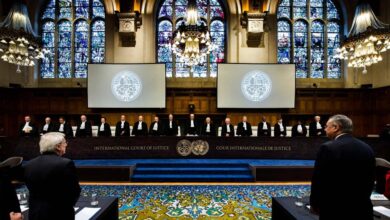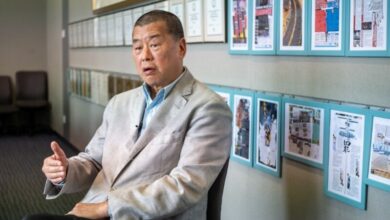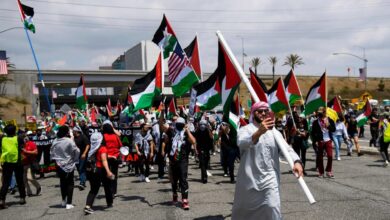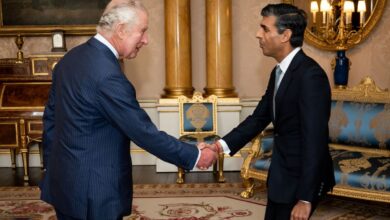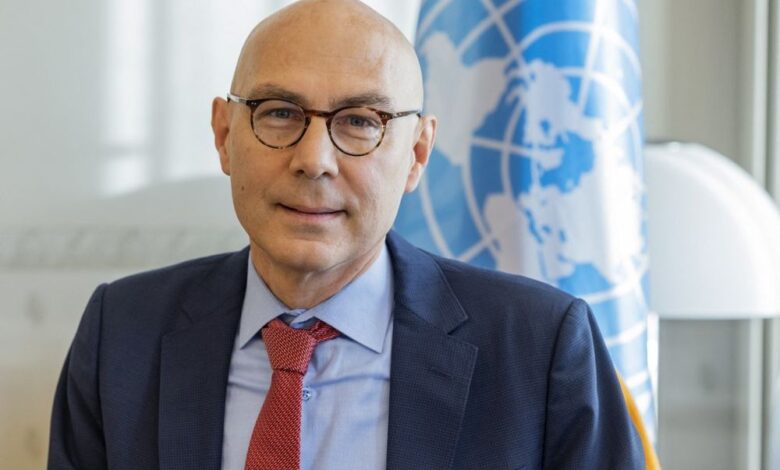
UN Chief Urges Myanmars Return to Civilian Rule
Un chief urges return to civilian rule on third anniversary of myanmar coup – Three years after the military seized power in a brutal coup, the UN Secretary-General has issued a stark call for Myanmar to return to civilian rule. The anniversary of the coup, marked by ongoing violence and human rights abuses, has intensified international pressure for a peaceful transition to democracy.
The UN’s plea highlights the dire situation in Myanmar, where the military junta continues to tighten its grip, silencing dissent and undermining the country’s fragile democratic institutions.
The UN’s stance reflects growing international concern over the deteriorating human rights situation in Myanmar. The military’s crackdown on dissent has resulted in widespread arrests, restrictions on freedom of speech, and violence against protesters. The coup has also had a devastating impact on the Myanmar economy, leading to widespread poverty and humanitarian crises.
The UN’s call for a return to civilian rule is a crucial step towards restoring peace and stability in the country.
International Response to the Crisis
The international community has responded to the coup in Myanmar with a range of measures, including sanctions, diplomatic efforts, and humanitarian aid. The response has been complex, with different countries and organizations taking different approaches.
Sanctions
Sanctions have been a key tool used by the international community to pressure the military junta in Myanmar. These sanctions target individuals and entities linked to the military regime, aiming to restrict their access to financial resources and international trade.
- The United States, the European Union, the United Kingdom, Canada, and Australia have imposed targeted sanctions on individuals and entities associated with the coup, including military leaders, government officials, and businesses.
- The sanctions include asset freezes, travel bans, and restrictions on trade. They aim to deter further human rights abuses and to encourage a return to civilian rule.
- The effectiveness of sanctions is a subject of debate, with some arguing that they have limited impact on the junta’s behavior, while others believe they have contributed to the regime’s isolation and financial difficulties.
Diplomatic Efforts
Diplomatic efforts have focused on urging the military junta to release political prisoners, restore civilian rule, and engage in meaningful dialogue with the National Unity Government (NUG), which represents the ousted civilian government.
- The United Nations Security Council has passed several resolutions condemning the coup and calling for a return to democracy. However, these resolutions have been hampered by the veto power of China and Russia, which have close ties to the Myanmar military.
- ASEAN, the Association of Southeast Asian Nations, has played a central role in mediating the crisis. However, its efforts have been criticized for being ineffective and for failing to hold the junta accountable.
- Individual countries, such as the United States, the United Kingdom, and Japan, have also engaged in diplomatic efforts to urge the junta to take steps towards a peaceful resolution.
Role of ASEAN
ASEAN, as a regional organization, has taken the lead in mediating the crisis in Myanmar. However, its efforts have faced significant challenges, including the junta’s resistance to dialogue and its continued crackdown on dissent.
- ASEAN’s Five-Point Consensus, adopted in April 2021, Artikeld a roadmap for resolving the crisis. It called for an end to violence, dialogue among all stakeholders, and the appointment of a special envoy to facilitate the process.
- However, the junta has been slow to implement the consensus, and ASEAN’s response has been criticized for being too lenient and for failing to hold the junta accountable for its human rights abuses.
- Some argue that ASEAN should have taken a stronger stance, including imposing sanctions on the junta or suspending Myanmar’s membership. Others believe that ASEAN’s efforts, despite their limitations, have provided a platform for dialogue and may ultimately contribute to a peaceful resolution.
Comparison of Responses
Different countries and organizations have taken different approaches to the crisis in Myanmar, reflecting their varying interests and priorities.
- Western countries, such as the United States and the European Union, have been more critical of the junta and have imposed significant sanctions. They have also provided support to the NUG and civil society groups.
- China and Russia have been more supportive of the junta, arguing that foreign interference in Myanmar’s internal affairs is counterproductive. They have opposed sanctions and have vetoed UN Security Council resolutions condemning the coup.
- ASEAN has sought to mediate the crisis through dialogue and diplomacy, but its efforts have been hampered by the junta’s intransigence and the lack of consensus among ASEAN members.
The State of Democracy in Myanmar
Myanmar’s journey towards democracy has been marked by periods of progress and setbacks. While the country experienced a brief period of democratic rule following the 2010 elections, the military’s longstanding influence and control over key institutions have hindered the establishment of a truly democratic system.
Historical Overview of Democracy in Myanmar
Myanmar’s history with democracy is complex and characterized by periods of authoritarian rule interspersed with brief periods of democratic reform. The country gained independence from British colonial rule in 1948, but a military coup in 1962 ushered in a period of military dictatorship that lasted for over 50 years.
It’s heartbreaking to see Myanmar still under military rule, three years after the coup. The UN Chief’s call for a return to civilian rule is a crucial reminder of the urgency of the situation. While the world focuses on the war in Ukraine, it’s important to remember other crises demanding attention.
As US Treasury Secretary Janet Yellen urges the G7 to jointly seize Russian profits to help Ukraine, urgent for g7 to jointly seize russian profits for ukraine yellen , we must also remember the people of Myanmar who are suffering under a brutal regime.
Their plight deserves equal attention and action.
During this time, the military, known as the Tatmadaw, held absolute power, suppressing dissent and curtailing civil liberties. The 1988 pro-democracy uprising, which was brutally suppressed by the military, marked a turning point in Myanmar’s political landscape. This event, known as the 8888 Uprising, led to the establishment of the State Law and Order Restoration Council (SLORC), which later became the State Peace and Development Council (SPDC).The SPDC introduced a gradual transition towards a semi-civilian government in the 2000s, culminating in the 2010 general elections.
The elections were widely criticized for being rigged and lacking in transparency, but they marked the first step towards a more democratic system. However, the military retained significant control over the political process, and the Tatmadaw continued to hold key positions in the government.The 2015 general elections, which saw the National League for Democracy (NLD), led by Aung San Suu Kyi, win a landslide victory, raised hopes for a genuine democratic transition.
The NLD’s victory was a significant milestone, marking the first time a civilian government had been elected in decades.
Key Factors Contributing to the Current Political Crisis
The current political crisis in Myanmar is a complex issue with several contributing factors. The military’s long-standing influence and control over key institutions, the Tatmadaw’s deep-rooted distrust of civilian rule, and the ongoing ethnic conflicts in the country have all contributed to the current situation.
The UN’s call for a return to civilian rule in Myanmar on the third anniversary of the coup is a stark reminder of the ongoing human rights crisis. It’s a situation that’s hard to ignore, much like Tiger Woods’ recent return to the PGA Tour, where he’s proven that despite the challenges, he still loves competing.
While the world watches Woods’ comeback, the situation in Myanmar demands our attention and action. The people of Myanmar deserve a peaceful and democratic future.
- The Military’s Influence:The Tatmadaw has maintained a powerful presence in Myanmar’s politics, controlling key ministries and institutions, and wielding significant influence over the political process. This influence has often undermined civilian authority and hindered the development of democratic institutions.
- Ethnic Conflicts:Myanmar is home to numerous ethnic groups, and decades of armed conflict between the military and various ethnic armed groups have contributed to instability and political turmoil. These conflicts have also exacerbated the existing power imbalances and hindered efforts to build a more inclusive and democratic society.
The UN chief’s call for a return to civilian rule in Myanmar on the third anniversary of the coup is a stark reminder of the ongoing crisis. It’s a crisis that affects not just the people of Myanmar, but the environment too.
Just like harmful reforestation planting trees in the wrong area can be damaging , the military’s actions have had devastating consequences for the country’s fragile ecosystem. A return to civilian rule is crucial not just for political stability, but for environmental sustainability as well.
- Lack of Transparency and Accountability:The military has a history of operating with little transparency and accountability, making it difficult to hold them accountable for their actions. This lack of transparency has fueled mistrust and undermined the legitimacy of the political system.
- Economic Inequality:Myanmar’s economy is characterized by significant economic inequality, with a large gap between the rich and the poor. This inequality has fueled social unrest and created a fertile ground for political instability.
Prospects for a Return to Civilian Rule and a Democratic Transition
The prospects for a return to civilian rule and a democratic transition in Myanmar remain uncertain. The military’s continued grip on power, the ongoing ethnic conflicts, and the lack of a clear roadmap for political reform pose significant challenges. The international community has imposed sanctions on Myanmar and called for the release of political prisoners, but these measures have had limited impact on the military’s actions.
The situation in Myanmar is complex and requires a multifaceted approach that addresses the underlying causes of the crisis. A return to civilian rule will require a genuine commitment to democratic reforms, including the establishment of a truly independent judiciary, the implementation of free and fair elections, and the protection of human rights.
“A return to civilian rule is not just about elections, it is about building a system that ensures the rule of law, protects fundamental rights, and allows for peaceful political participation.”
UN Secretary-General António Guterres
The Future of Myanmar
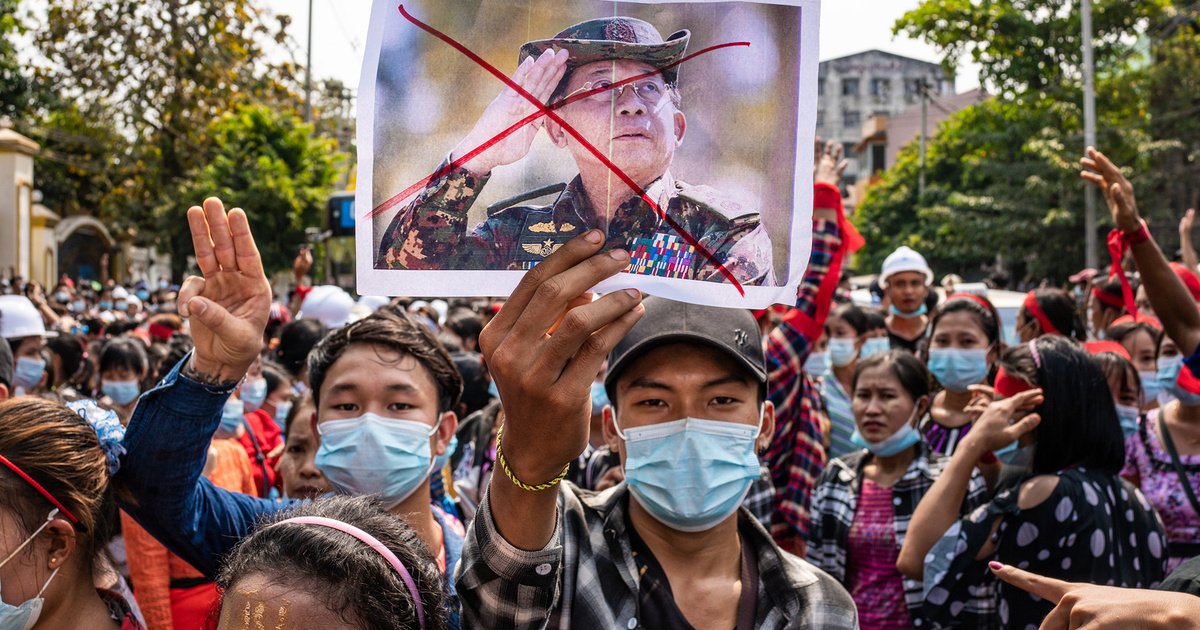
The third anniversary of the military coup in Myanmar marks a crucial moment for the country. The path forward remains uncertain, with various factors influencing the potential outcomes. This section explores different scenarios for Myanmar’s future, considering international pressure, internal dissent, and economic conditions.
It also identifies challenges and opportunities for a peaceful and democratic transition.
Potential Scenarios for Myanmar’s Future, Un chief urges return to civilian rule on third anniversary of myanmar coup
The future of Myanmar hinges on a complex interplay of forces. Several potential scenarios could unfold, each with its own implications for the country’s political, economic, and social landscape.
Scenario 1: Continued Military Rule
The military could consolidate its power and maintain control over the country, potentially leading to a prolonged period of repression and instability. This scenario would likely involve further restrictions on civil liberties, intensified crackdowns on dissent, and a continued decline in economic conditions.
The military could also face increasing international isolation and sanctions, potentially leading to further economic hardship.
Scenario 2: A Negotiated Transition
The military could engage in negotiations with pro-democracy forces, leading to a gradual transition towards a more inclusive and democratic system. This scenario would require significant concessions from the military, including a commitment to human rights and the rule of law.
It would also require a strong commitment from the international community to support the transition process.
Scenario 3: A Renewed Civil War
The conflict between the military and pro-democracy forces could escalate into a full-scale civil war, further destabilizing the country and causing widespread suffering. This scenario would likely involve increased human rights violations, displacement, and humanitarian crises. It would also make it more difficult to achieve a peaceful and democratic transition.
Challenges and Opportunities for a Peaceful Transition
A peaceful and democratic transition in Myanmar faces significant challenges, including:* The Military’s Grip on Power:The military remains deeply entrenched in the political and economic structures of the country, making it difficult to dismantle its power.
Internal Divisions
Myanmar is divided along ethnic, religious, and political lines, making it difficult to build a national consensus on the future of the country.
Economic Challenges
The country faces severe economic challenges, including poverty, unemployment, and a lack of infrastructure. These challenges could exacerbate existing tensions and make it more difficult to achieve a peaceful transition.Despite these challenges, there are also opportunities for a peaceful and democratic transition, including:* International Pressure:The international community has condemned the coup and imposed sanctions on the military regime.
Continued pressure could encourage the military to negotiate a transition.
Internal Dissent
The resistance movement has shown resilience and determination in its fight against the military. This movement could play a crucial role in shaping the future of the country.
Economic Incentives
The international community could offer economic incentives to the military in exchange for a transition to democracy.
Key Actors and Stakeholders
The Myanmar crisis involves a complex web of actors and stakeholders, each with their own interests and potential to influence the future of the country.
Key Actors
- The Military:The military holds significant power and influence, and its decisions will be critical in determining the future of the country. The military’s willingness to negotiate and compromise will be a key factor in determining whether a peaceful transition is possible.
- The National Unity Government (NUG):The NUG is a shadow government established by pro-democracy forces. It has gained international recognition and has been working to build support for a transition to democracy. The NUG’s ability to unite the resistance movement and secure international support will be crucial to its success.
- Ethnic Armed Groups:Myanmar is home to numerous ethnic armed groups, some of which have been fighting for greater autonomy for decades. The role of these groups in a future transition will be complex, as they have different interests and agendas. Their willingness to participate in a negotiated settlement will be essential for a peaceful transition.
- The International Community:The international community has a significant role to play in shaping the future of Myanmar. The United Nations, the Association of Southeast Asian Nations (ASEAN), and individual countries can exert pressure on the military, provide humanitarian assistance, and support a transition to democracy.
Potential Roles in Shaping the Future
* The Military:The military could choose to continue its crackdown on dissent, leading to further instability and international isolation. Alternatively, it could engage in negotiations with pro-democracy forces, paving the way for a more inclusive and democratic system.
The NUG
The NUG could become a key player in a negotiated transition, uniting the resistance movement and advocating for a democratic future. It could also face challenges in securing international recognition and support.
Ethnic Armed Groups
These groups could play a role in shaping a future federal system, but their participation will depend on their willingness to compromise and engage in negotiations.
The International Community
The international community could continue to impose sanctions on the military, provide humanitarian assistance, and support a transition to democracy. It could also play a role in mediating negotiations between the military and pro-democracy forces.
Ultimate Conclusion: Un Chief Urges Return To Civilian Rule On Third Anniversary Of Myanmar Coup
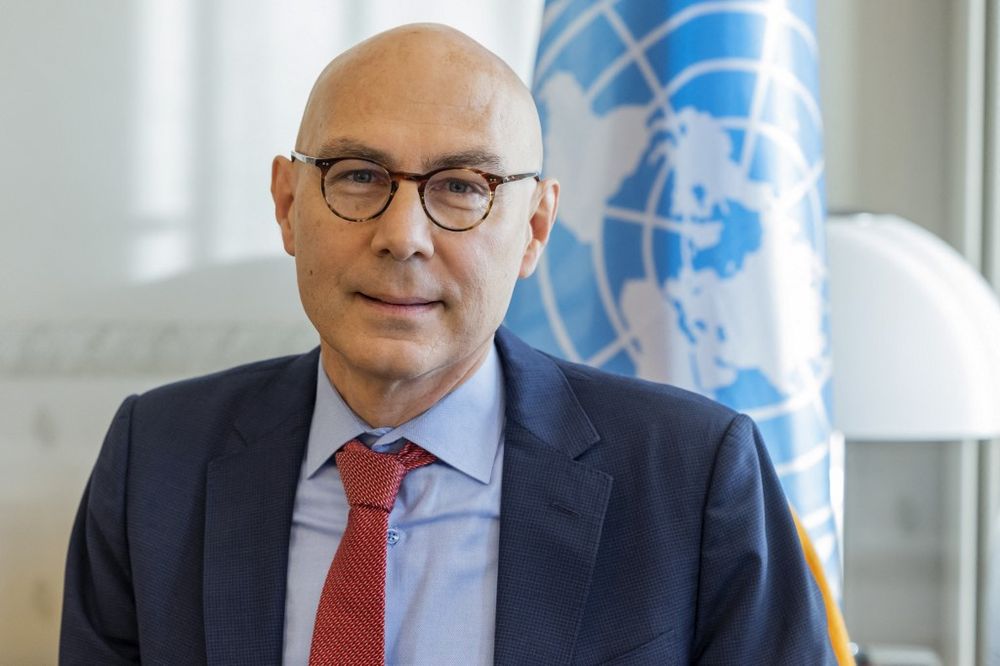
The third anniversary of the Myanmar coup serves as a stark reminder of the ongoing struggle for democracy and human rights. The UN’s call for a return to civilian rule is a vital step towards addressing the crisis, but it is only the beginning.
International pressure, coupled with a commitment to human rights and democratic principles, is essential for ensuring a peaceful and just future for Myanmar. The international community must remain vigilant and steadfast in its support for the people of Myanmar, who continue to fight for their fundamental freedoms.

